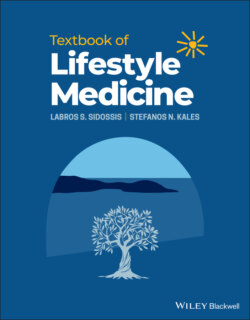Читать книгу Textbook of Lifestyle Medicine - Labros S. Sidossis - Страница 118
Key Point
ОглавлениеThe followers of Islam eat foods that purify their body and spirit from all kinds of dirt and impurities.
Islam discourages overconsumption of food and the intake of stimulants (such as coffee, tea, alcohol). Muslims fast on Mondays and Tuesdays and for a 6‐day period during the 10th month of the Islamic year, named Shawwal. However, their most renowned fasting period is the holy month of Ramadan, the ninth month according to the Islamic calendar. During Ramadan, Muslims do not eat or drink anything from sunrise to sunset, approximately 13–18 hours/day.
Ramadan fasting has been associated with weight loss, attenuation of several metabolic markers (such as insulin resistance, high blood glucose, and high BP), improvements in lipid profile, prevention of chronic diseases (such as obesity, diabetes, CVDs, and cancer), and protection against neurodegeneration and inflammation. However, the results from the Epidemiology of Diabetes and Ramadan (EPIDIAR) study, which included patients with T1DM and T2DM, suggested that fasting during Ramadan can result in an increased number of hypoglycemic episodes. Education on diabetes management and medication adjustments prior to Ramadan has been shown to help overcome these problems.
In a systematic review and meta‐analysis of 70 publications with a total of 2947 subjects, a significant reduction in body fat was found between the pre‐Ramadan and post‐Ramadan period, but only in overweight or obese individuals. However, a significant loss of fat‐free mass (i.e., muscle and bone) was also found between pre‐Ramadan and post‐Ramadan. Nevertheless, 2–5 weeks after the end of Ramadan, weight and body composition returned to pre‐Ramadan levels, as is the case when any kind of diet based on caloric restriction is discontinued.
